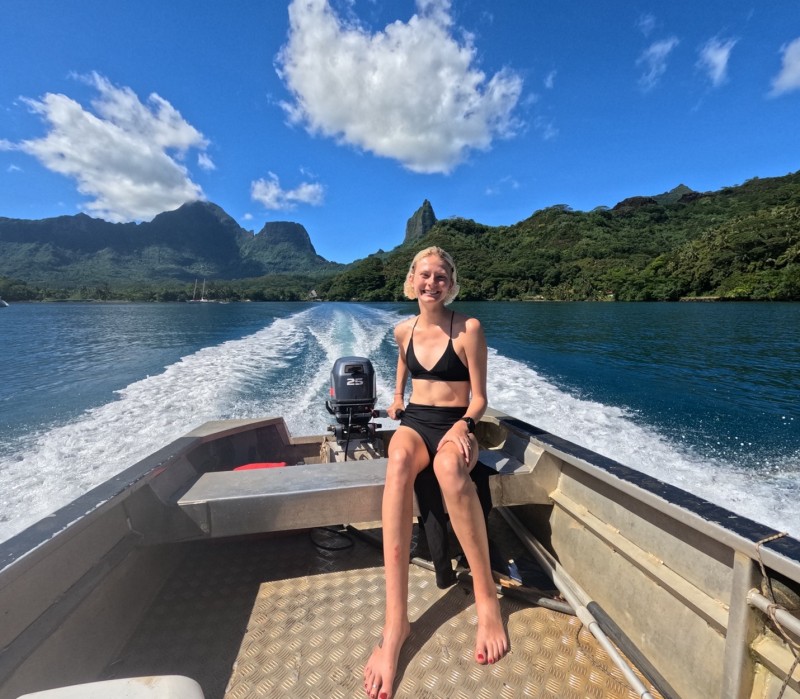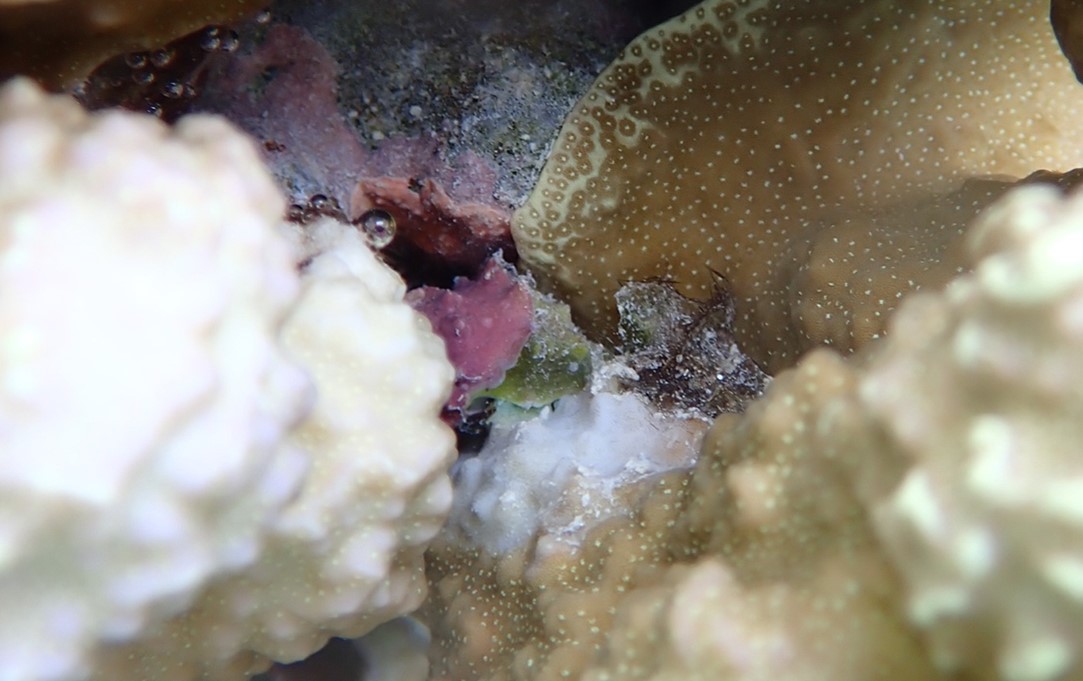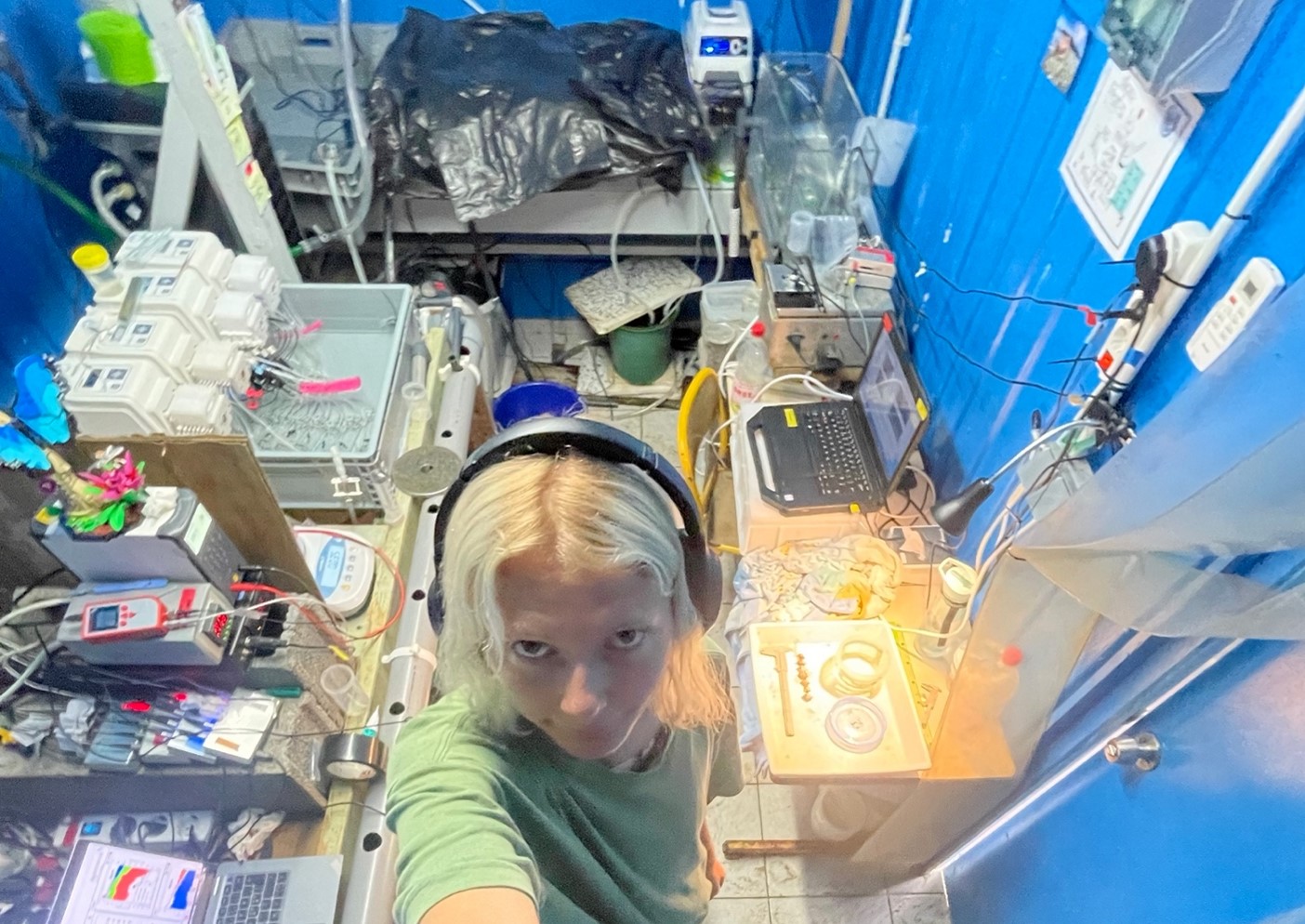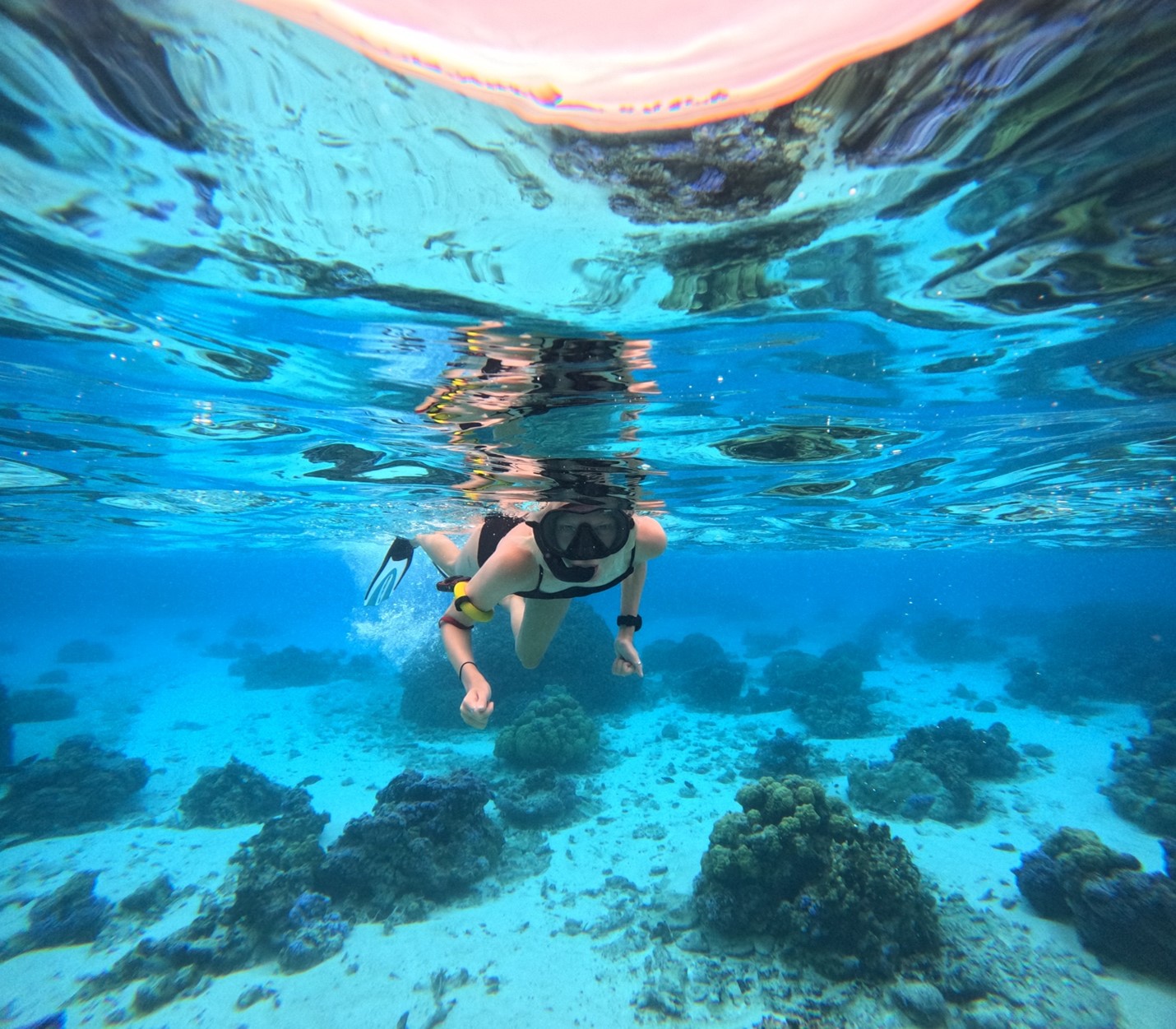CRIOBE Research Station
Ashlynn White
University of Glasgow

In February 2024, I departed from Glasgow to the tropical paradise of Moorea, a small island just a thirty-minute ferry ride from Tahiti in French Polynesia. With the support of the Challenger Society funding, I was able to spend three months at the Centre for Island Research and Environmental Observatory (CRIOBE) Research Station collecting data for my postgraduate research which I am undertaking at the University of Glasgow. CRIOBE, a French marine research station nestled at the base of breathtaking mountains, offered an ideal setting for my research. Travelling to French Polynesia was necessary as it was home to my target species and CRIOBE offered a suitable laboratory space for my study.
My research focuses on Drupella, small sea snails found on reefs throughout the Indo-Pacific which have the potential to cause significant ecological impacts. Drupella are corallivores (they eat coral) and, in normal population sizes, can benefit a reef by clearing out faster-growing coral species like Acroporidae, allowing space for slower-growing corals to grow. However, when Drupella populations increase exponentially, as observed in countries including Australia, the Maldives, and Japan, they can devastate reefs and feed on most corals when their preferred corals aren’t present. For instance, in Northwest Australia Drupella destroyed over 90% of the northern part of Ningaloo Reef. The causes of these population explosions are still unknown, but anthropogenic influences are suspected: overfishing of natural predators, increases in water nutrients, and rising temperatures are all theories that have been suggested. In addition to the direct threat Drupella place on reef ecosystems, there is an increasing concern that as coral reefs are put under greater pressure from factors such as mass bleaching events, coral predator feeding could significantly reduce the chances of reef recovery. Despite these concerns, little research has been conducted on the physiology of Drupella or how shifts in environmental conditions will influence them, with little understanding of how Drupella will cope during warming temperatures. This gap in knowledge led me to peruse an investigation on the impacts of temperature increases on Drupella physiology, particularly their metabolic and feeding rates. The aim of my research is to understand how these snails will respond to shifting oceanic conditions, helping us assess the future risk they may pose to reefs.


The next phase of my stay involved acclimating the Drupella to their separate temperature treatments and conducting experiments to collect the necessary data, focusing on measuring their metabolic and feeding rates. The snails were kept at one of four different temperatures, ranging from 28 to 34 degrees in 2-degree increments. To measure their metabolism, I used a method called intermittent flow respirometry, which involved keeping the snails in individual chambers overnight and measuring their oxygen uptake rate. Intermittent flow respirometry is a common method used to measure the metabolism of aquatic organisms, involving placing the organism in a sealed chamber where water is intermittently flushed to provide oxygen and remove waste. Between flushes, the chamber is closed, and the oxygen consumption of the organism is measured. This allows us to estimate metabolic rate by looking at oxygen uptake levels over a long period of time. I conducted metabolic experiments five days a week for almost two months, becoming quite accustomed to the methodologies. Towards the end of my stay, I conducted 12-hour temperature ramping studies, where the temperature of the respirometry system was increased by 1 degree every thirty minutes to observe the snails' response to acute temperature increases. To measure the snails' feeding rates, I left them with a piece of Acropora overnight and took photos of either side of the coral the next day. When the snails feed, they strip away the coral polyps, leaving a white “scar” on the coral. Using a software called ImageJ I could estimate the surface area of feeding by measuring the scarring present on the coral images.

During my time at CRIOBE, I also had the opportunity to assist with other researchers' projects. I helped catch clownfish for a study on the impact of growth on metabolism and more generally learned a lot about life as an academic at marine biology research. Beyond working in the field and gaining numerous laboratory skills, I spent my free time snorkelling, diving, hiking, and swimming, spending as much time as possible in nature before returning to rainy Glasgow.
I am deeply grateful for receiving the Challenger Society Travel Award. This invaluable opportunity has allowed me to collect essential data for my master’s research and gain extensive practical experience in both fieldwork and laboratory settings. Additionally, being part of an academic field station has exposed me to a wide range of research projects across various marine biology fields. I hope my work will contribute to a better understanding of the risks Drupella pose to coral reef ecosystems, especially in the context of coral reef decline.
Profile
Ashlynn White is a Master of Research student at the University of Glasgow. She has always had a love for animals and the ocean, knowing from a young age that she wanted to work to help protect our planet. She is particularly interested in coral reef ecosystems and the influence of the environment on animal physiology.
Latest News
Marine Data Management, Governance and the MEDIN toolset
The Marine Environmental Data and Information Network (MEDIN) and OceanWise are delighted to invite you to attend our popular free online training workshop: ‘Marine Data Management, Governance and the MEDIN toolset’ on the 19th – 23rd of May 2025.
Workshop on the contribution of UK Arctic Ocean science to the International Polar Year 32/33
12:00 11th June – 16:00 12th June 2025: NOC Southampton (In-person with online option): Registration deadline 16th May
REGISTER HERE
Pre-meeting questionnaire (open to all)
The purpose of this workshop is for the UK Ocean Science community to discuss and then draft a prospectus document outlining the priority Arctic research questions the community would like to address during the run up to, throughout and beyond the International Polar Year 32/33. Additionally, to identify what unique strengths and technologies the UK has to help fill these knowledge gaps.
The second day of the workshop will be dedicated to writing groups, one for each of the priority research questions identified - from both the pre-meeting questionnaire (HERE) and day one discussion. By the end of the meeting, each group will have produced draft text and sourced supporting figures for the prospectus.
Post meeting, the draft will be opened for comments and suggestions from everyone, regardless of whether they were able to attend the workshop or not. It will then be shared with UK funders (UKRI, FCDO, DSIT, ARIA) and potential international programmes with whom we would like to collaborate (e.g. Arctic 2050, Norway). It will form a basis from which wider integration with terrestrial, atmospheric and cryosphere communities can be built, e.g. at the UK Arctic Science Meeting in September in Northumbria.
To ensure balanced community and ECR representation, and to ensure that the size of the writing groups is efficient and effective, if the number of registrations from individual institutes becomes overwhelming, we may contact individuals or teams and ask that each institute selects a smaller number of individuals to attend in-person. Please wait for confirmation of in-person attendance before finalising travel arrangements.
The workshop will be open to hybrid attendance and contributions on both days.
Challenger Society Council Position Vacancy
The Challenger Society for Marine Science (CSMS) are pleased to announce an exciting opportunity to support the next generation of ocean scientists and innovators. CSMS are looking for a new Council member to fill the Student Travel Awards and Stepping Stones Portfolio. The successful applicant will administer the travel and research grants available for Early Career Researchers.
The role involves:
- Receiving applications for the two schemes and responding to applicant inquiries
- Soliciting and compiling input from the rest of the Council for assessing the applications
- Communicating with successful and unsuccessful applicants for the two schemes
- Working with the Honorary Treasurer on allocating funds to successful applicants
- Following up with award winners on their reporting requirements
- Attending Council meetings four times a year (in person or online) and contributing to discussions and decision making for CSMS
The usual term for Council members is three years.
For more information about the CSMS Council, please follow this link: https://www.challenger-society.org.uk/The_Council
For more information about our Early Career Researcher grants and awards, please follow this link:
https://www.challenger-society.org.uk/Stepping_Stones
and
https://www.challenger-society.org.uk/Travel_awards
If you are interested in applying or have any questions regarding the role, please contact kathen@bas.ac.uk
